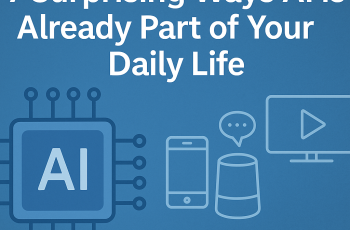You don’t need to be a tech enthusiast to benefit from artificial intelligence. In 2025, AI is quietly powering apps and tools that help with everyday tasks like parenting, cooking, and shopping. These tools are designed for real people — not coders — and they’re making life easier in ways that were hard to imagine even five years ago.
Let’s take a look at a few practical examples.
1. Parenting Help Through Smart Scheduling and Alerts
Busy parents are using AI-powered calendar tools like TimeHero or Motion to coordinate school runs, extracurriculars, and work meetings. These apps analyze your daily habits and automatically adjust your schedule for conflicts or bottlenecks.
AI baby monitors are also getting smarter — some can detect unusual crying patterns or breathing irregularities and alert you in real time.
2. Meal Planning Made Simple
Apps like Whisk, Mealime, and Yummly now offer AI-driven meal recommendations based on your dietary preferences, grocery budget, and pantry inventory. These platforms adjust recipes automatically (e.g., for gluten-free or low-carb diets), and can generate a full grocery list in seconds.
Voice assistants can now walk you through cooking steps hands-free — ideal when your hands are full (or messy).
3. Smarter Grocery Shopping
Grocery apps like Instacart and Ocado now use AI to suggest items you might have forgotten, based on previous orders and what’s popular for the current season. Some even alert you if you’re missing ingredients for planned meals.
In-store, smart carts and mobile scanners are helping shoppers speed up checkout and keep track of spending in real time.
4. Home Management with Smart Devices
Smart home hubs like Google Nest or Amazon Echo now control more than just lights. AI helps you automate temperature settings, track energy usage, and even detect anomalies in water or gas usage.
Some systems learn your routines (like when you usually leave or return) and automatically adjust settings to optimize energy efficiency.
5. Shopping for Clothes or Gifts
AI is improving retail apps by offering personalized size suggestions, outfit matching, and gift recommendations based on browsing behavior or previous purchases. Some apps can even “see” your body type through a photo and suggest better fits.
For gifts, platforms like GiftAI or Boomf use simple surveys to recommend curated presents based on the recipient’s interests and age.
6. Language Translation in Real Time
Whether you’re traveling or just navigating a multicultural city, AI tools like Google Translate and DeepL offer increasingly accurate real-time translation. Some apps now provide context-aware translation, recognizing idioms or slang and adjusting accordingly.
This is especially helpful for expats, travelers, or anyone working in an international setting.
Final Thoughts:
AI isn’t just for work or big companies — it’s becoming a powerful co-pilot in the daily lives of families, shoppers, cooks, and caregivers. These tools aren’t just smart — they’re designed to help us stay organized, save time, and reduce stress in ways that are actually useful.
